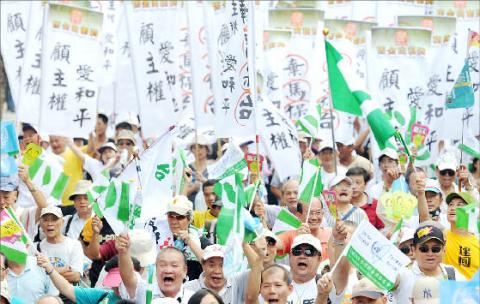Thousands of people attended a rally yesterday afternoon in Taipei to voice their opposition to the so-called “1992 consensus” and express their concern over Taiwan’s sovereignty under President Ma Ying-jeou’s (馬英九) administration.
Thousands of people gathered in front of the Presidential Office to mark the 60th anniversary of the signing of the San Francisco Peace Treaty as part of the rally, which was organized by the Taiwan Nation Alliance.
The aim of the parade was to say to both the Chinese Nationalist Party (KMT) and the international community that Taiwan does not belong to China, organizers said.

Photo: Lo Pei-der, Taipei Times
Japan signed the San Francisco Peace Treaty with 48 UN member countries in a meeting on Sept. 8, 1951. In the treaty, Japan declared that it would relinquish its claims to Taiwan, Penghu and all other offshore islands.
Although the treaty has weight in international law, it does not say to which party Japan ceded Taiwan and Penghu, alliance spokesperson Yao Chia-wen (姚嘉文) said, adding that this means Taiwan is not part of China and that Taiwanese have the right to establish their own country.
The “1992 consensus” never existed, Yao said, adding that by accepting a consensus on the basis of “one China,” Ma had committed treason because he claimed that Taiwan’s sovereignty belongs to another country.
The parade started in front of Wanhua (萬華) Train Station at 2:28pm, in commemoration of the 228 Massacre in 1947, and ended on Ketagalan Boulevard.
Several political parties, including the Democratic Progressive Party (DPP), the Taiwan Solidarity Union (TSU) and the Taiwan Nationalist Party, as well as many pro-independence groups, took part.
During the parade the crowd chanted slogans: “Dump Ma, protect Taiwan,” “Taiwan Consensus: ‘One China, One Taiwan’” and “Protect sovereignty, safeguard peace,” with protestors carrying various handmade signs and placards, some of which read “anti--annexation” and “China: hands off Taiwan.”
The parade was held to remind the international community that the San Francisco Peace Treaty gave Taiwanese the status of “free men” who, like people of other colonies around the world after World War II, were given the right to establish their own country, TSU Chairman Huang Kun-huei (黃昆輝) said.
Taiwan’s sovereignty belongs to no one else — neither to the Republic of China nor the People’s Republic of China. It belongs only to Taiwanese, he said.
It is a fact that Taiwan’s status remains undetermined, because the “Taiwan problem” after World War II was handled differently from that of Korea and Okinawa, said Chen Yi-shen (陳儀深), an associate research fellow in the Institute of Modern History at Academia Sinica.
After Japan ceded its right to Taiwan and Penghu, Taiwanese never exercised their right to self-determination and this was because of the occupation by KMT military forces, Taiwan Association of University Professors president Chang Yen-hsien (張炎憲) said, adding that if the KMT won the presidential election next year, Taiwan’s status risked being be further jeopardized.
“Nobody can deny the fact that Taiwan is a sovereign country,” DPP Secretary-General Su Jia-chyuan (蘇嘉全) told reporters before the parade.

CHAOS: Iranians took to the streets playing celebratory music after reports of Khamenei’s death on Saturday, while mourners also gathered in Tehran yesterday Iranian Supreme Leader Ayatollah Ali Khamenei was killed in a major attack on Iran launched by Israel and the US, throwing the future of the Islamic republic into doubt and raising the risk of regional instability. Iranian state television and the state-run IRNA news agency announced the 86-year-old’s death early yesterday. US President Donald Trump said it gave Iranians their “greatest chance” to “take back” their country. The announcements came after a joint US and Israeli aerial bombardment that targeted Iranian military and governmental sites. Trump said the “heavy and pinpoint bombing” would continue through the week or as long

TRUST: The KMT said it respected the US’ timing and considerations, and hoped it would continue to honor its commitments to helping Taiwan bolster its defenses and deterrence US President Donald Trump is delaying a multibillion-dollar arms sale to Taiwan to ensure his visit to Beijing is successful, a New York Times report said. The weapons sales package has stalled in the US Department of State, the report said, citing US officials it did not identify. The White House has told agencies not to push forward ahead of Trump’s meeting with Chinese President Xi Jinping (習近平), it said. The two last month held a phone call to discuss trade and geopolitical flashpoints ahead of the summit. Xi raised the Taiwan issue and urged the US to handle arms sales to

State-run CPC Corp, Taiwan (CPC, 台灣中油) yesterday said that it had confirmed on Saturday night with its liquefied natural gas (LNG) and crude oil suppliers that shipments are proceeding as scheduled and that domestic supplies remain unaffected. The CPC yesterday announced the gasoline and diesel prices will rise by NT$0.2 and NT$0.4 per liter, respectively, starting Monday, citing Middle East tensions and blizzards in the eastern United States. CPC also iterated it has been reducing the proportion of crude oil imports from the Middle East and diversifying its supply sources in the past few years in response to geopolitical risks, expanding

Pro-democracy media tycoon Jimmy Lai’s (黎智英) fraud conviction and prison sentence were yesterday overturned by a Hong Kong court, in a surprise legal decision that comes soon after Lai was jailed for 20 years on a separate national security charge. Judges Jeremy Poon (潘兆初), Anthea Pang (彭寶琴) and Derek Pang (彭偉昌) said in the judgement that they allowed the appeal from Lai, and another defendant in the case, to proceed, as a lower court judge had “erred.” “The Court of Appeal gave them leave to appeal against their conviction, allowed their appeals, quashed the convictions and set aside the sentences,” the judges